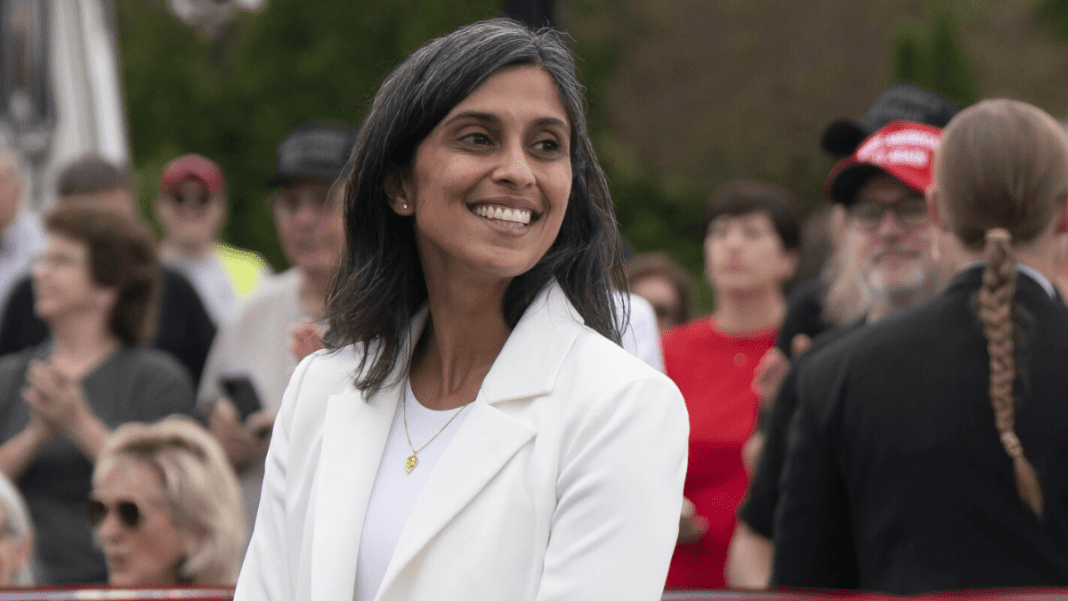Reports suggest that U.S. President Donald Trump may have turned to Usha Vance, wife of Vice President JD Vance, for legal advice on a significant deal involving Ukraine’s mineral resources. The claim, mentioned in an upcoming book by White House chronicler Jonathan Karl, has sparked wide interest due to Usha’s low public profile and the sensitive nature of the matter.
The issue reportedly arose when President Trump and Vice President JD Vance debated whether the February deal had been fully reviewed by legal experts. During this discussion, the Vice President is said to have proposed, “I can have Usha take a look at it,” pointing to her background as a Yale Law School graduate and former federal judicial clerk. Usha Vance has experience in civil litigation and appeals but has never been involved in national security or international agreements. Her sudden link to the Ukraine deal has therefore surprised many and raised questions about her potential influence.
According to Karl’s account, Trump expressed concerns about the legal clarity of the deal, prompting JD Vance to seek his wife’s opinion. Usha did not volunteer for the role; instead, she agreed after her husband suggested her expertise might help resolve the matter. This private exchange set the stage for what some are calling one of the most unusual behind-the-scenes moments in the administration’s recent dealings.
‘Tell me why not’: Trump dodges questions about third run, sparks firestorm over 22nd Amendment
The West Wing Visit and Legal Review
Following that conversation, Usha Vance reportedly visited the West Wing to review the agreement in detail. Sources claim she examined the documents carefully but did not confirm whether she made any formal recommendations or changes. The White House has declined to comment, which has fueled public speculation over the accuracy of the reports and the extent of her involvement.
Despite her strong legal background, Usha’s lack of national security experience has drawn scrutiny. Critics argue that reviewing an international agreement of such magnitude falls outside her expertise. However, her supporters believe her disciplined legal approach and education make her capable of offering sound advice, even on complex matters.
This alleged decision fits a familiar pattern in President Trump’s leadership style. He has often favored trusted associates over traditional experts, valuing loyalty and familiarity. The idea of turning to the Vice President’s wife for counsel reinforces this approach. It also highlights the close personal relationships that often shape the administration’s most critical decisions.
Adding another layer of intrigue, Steve Bannon, Trump’s former White House adviser, was reportedly consulted around the same time. In Jonathan Karl’s forthcoming book, both Usha Vance and Bannon are mentioned as having reviewed the Ukraine deal despite having “no official role” on the National Security Council. The agreement was said to be ready for signing the very next day, making their involvement even more notable.
Reactions and Public Scrutiny
News of Usha Vance’s participation has led to mixed reactions within political and legal circles. Many are surprised, as she has generally stayed away from federal policy discussions, preferring to focus on family and professional life outside the spotlight. Her quiet presence contrasts sharply with the sudden attention this report has brought.
Those familiar with her describe her as intelligent and composed, while critics view the situation as an example of personal connections influencing national matters. Some have drawn parallels with past instances in which President Trump appointed individuals outside their areas of expertise, such as Robert F. Kennedy to the Department of Health and Human Services and Pete Hegseth to a key defense position. These examples underline a recurring theme in Trump’s governance—placing trust in allies rather than seasoned officials.
As of now, there has been no confirmation from the White House regarding Usha Vance’s official role or input on the Ukraine deal. What remains clear is that her name has become central to one of the administration’s most talked-about developments. The blend of loyalty, secrecy, and political pressure surrounding the episode has captured national attention, placing Usha Vance unexpectedly in the spotlight and sparking debate about the boundaries between personal trust and official responsibility within the Trump administration.





